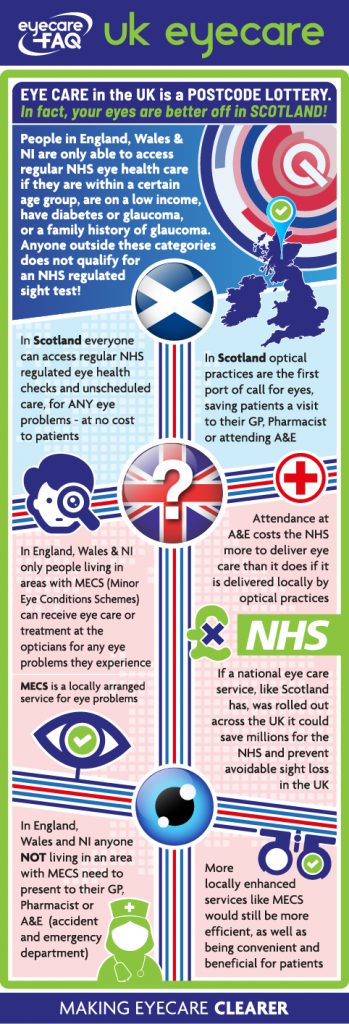Scots lead the way in UK eye health care
It’s truly a postcode lottery when it comes to eyecare in England, Wales and Northern Ireland (NI), compared to Scotland which provides national eye care for all, according to the Association of British Dispensing Opticians’ latest research which compares NHS eye care in England, Northern Ireland, Scotland and Wales.
People in England, Wales and NI are only able to access regular NHS eye health care if they are within a certain age group, have diabetes, or glaucoma, or a family history of glaucoma, or a low income. Anyone outside these categories does not qualify for an NHS regulated sight test. [1]
In Scotland everyone can access regular NHS regulated eye health checks and unscheduled care, for any eye problems, at no cost to patients.[2] (Cost has been identified as a barrier to people accessing care [3]). The Scottish system enables optical practices to be the first port of call for eyes, saving patients attending their GP, Pharmacist or accident and emergency departments (A&E).
Only people living in areas, with Minor Eye Conditions Schemes (MECS – a locally arranged service for eye problems) in England, Wales and NI can receive eye care/treatment for any eye problems they experience. Anyone not living in an area with MECS need to present to their GP, Pharmacist or A&E which can sometimes lead to misdiagnosis depending on the health care professional they see, if they do not get attended to by a dispensing optician, optometrist or ophthalmologist who are the experts in eye care.
Attendance at A&E costs the NHS more to deliver eye care than it does if it is delivered locally by optical practices.[4] If a national eye care service, like Scotland has, was rolled out across the UK it could save millions for the NHS and prevent avoidable sight loss in the UK. Failing that, provision of more locally enhanced services like MECS would still be more efficient, as well as being convenient and beneficial for patients.
ABDO President Clive Marchant says, “Getting the right eye care at the right time from the right clinician is important from the cradle to the grave. We would like to see everyone having access to regular eye examinations from pre-school onwards to give kids the best start in life. The risk of eye disease grows as you get older, and it is vital for eye disease to be detected as early as possible which can only be done by regular eye health checks. Scotland is leading the way here with other countries doing the best they can with the funding available.
“Minor Eye Conditions schemes (MECS) allow you to walk into your local optician with a red or irritated eye for diagnosis and treatment. MEC schemes are more convenient for the user and can save the NHS millions, but right now it is a postcode lottery as to whether there is one in your area of England. Wales or NI.”
Clive also believes better low vision services are needed now across the UK. He says, “The ageing population is increasing and the Government needs to provide more low vision services in primary care. There is a great model to follow: Wales’ excellent Low Vision scheme offering NHS low vision services in local optical practices which makes it easy for people to access the care they need locally, and this should be rolled out across the UK. Scotland has already identified a need for a national low vision service (eye care services review 2017) which we hope will mirror Wales and we also hope that dispensing opticians will be at the forefront when this is implemented in Scotland.”
[3] https://www.rnib.org.uk/knowledge-and-research-hub/research-reports/prevention-sight-loss/access-eye-care
